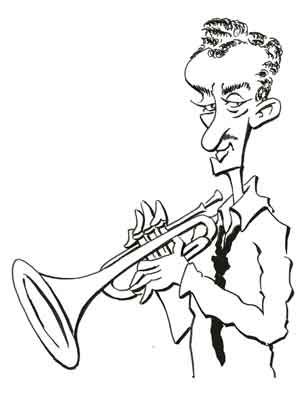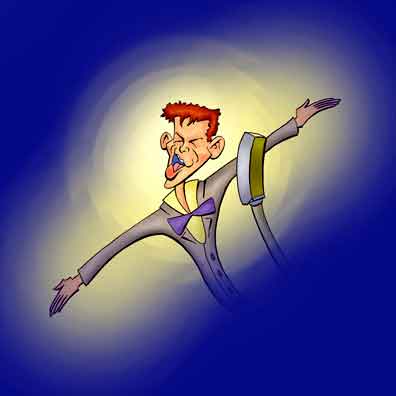Harry James
The Best
(According to Some)

Harry James
The Youngster
Harry James is not as well known today as are his contemporaries like Glenn Miller, Benny Goodman, and Tommy or Jimmy Dorsey. That may be because Harry was not exactly a contemporary but a bit on the more youthful side. Even Benny - born in 1909 - had a seven year advantage on Harry. So these - ah - "elderly gentleman" had a head start on Harry in the Big Band Business.
Harry's dad was a bandleader in a circus where Harry played drums and trumpet. Eventually the family settled in Beaumont, Texas, and Harry knew he wanted to play in a big band. As was usual for young musicians of the time and place, he first performed in small local dance orchestras but in 1935 finally joined Ben Pollack, a nationally known band leader, who for various reasons almost had his entire band walk out. One story is Harry had also tried out with Lawrence Welk who either told Harry he played too loud or said he only wanted players who could play four or five instruments (Harry played only trumpet and drums). Then in 1937, Harry went to work for the even more popular Benny Goodman.
Harry quickly became a major performer with Benny. He not only was the band's principal trumpet player, but he would sometimes stand in on drums since Benny had trouble keeping drummers after Gene Krupa left. More importantly, if Benny was not able to make a performance, Harry would take over as leader. So it's no surprise that Harry soon wanted to strike out on his own.
Harry's last performance with Benny was January 10, 1939. But at the time Harry only had $400 in the bank - not enough to bankroll a band. However, Benny was willing to put up some money to help fund who was actually a competitor.
As with many of the big bands, Harry's orchestra lasted much longer than the Big Band Era itself. Although the Era's beginning has been given variously as early as 1920 and as late as 1935, most agree it ended in 1945 with the end of World War II. So when Harry started his band, the Era was not far from ending. And yet Harry was still performing in the 1980's.
Harry and the band got a bit of a boost in the 1950's and early 60's with the rise of television. He would appear, not just with his band, but also as a guest actor on shows like I Love Lucy and Make Room for Daddy (also known as The Danny Thomas Show).
The latter episode - "The Trumpet Player" - was actually quite funny. Harry plays the leader of a YMCA band who on hearing the audition of Danny's son, Rusty, playing the drums, criticizes not Rusty, but whoever Rusty's teacher was. The teacher, Harry said, did not ground Rusty in the basics but only taught him fancy riffs. Of course, the teacher was none other than Danny himself who in outrage ends up pulling Rusty from contention. Eventually things get sorted out and Rusty joins the band. Naturally the show allowed Harry to show off his trumpet playing in the evitable but still amusing penultimate scene.
It's odd that today Harry seems to be the one trumpet player many people don't know. After all, Doc Severinsen - no mean player we might add - later said he thought Harry was the best trumpet player ever1. But those who know Harry, if for nothing else, know he was the first bandleader to hire the son of a Hoboken boxer Marty O'Brien. Marty, although he is listed as a professional boxer, did not have a stellar record. In a ten-year career, his win-loss record was 1-7, five of the losses by knockouts. He retired in 1921.
Footnote
In his early years Doc played for Tommy Dorsey, although when they first met Doc was only fourteen years old. Even before hearing Doc play, Tommy himself took Doc's trumpet (cornet actually) and played some extremely taxing trumpet solos. Doc was flabbergasted and Tommy told Doc to come back after he finished school and when he learned to play better. Obviously Doc did both.
According to some accounts, Marty's son - whose name was Francis - also had ambitions in following the Sweet Science. But a combination of his light weight - he was quite skinny - and the aspirations of his mom, Natalie (whose friends called her Dolly) scotched that idea. Dolly thought her son could do better with his Voice. Marty - whose real name was Antonio Martino Sinatra - acquiesced2.
Footnote
One visitor to the - quote - "O'Brien Home" - unquote around 1923 said he and Jack Dempsey's manager - Jack "Doc" Kearns - actually saw young Frankie take a couple of practice boxing swings. Doc was so impressed that he told Marty that if Frank did go into boxing to call him up. Marty, though, said that Dolly was dead set against Frankie becoming a boxer.
Whether Doc would make such an offer on seeing a couple of air-punches from a skinny eight-year-old is worthy of question. In later years Frank may have donned gloves a bit but one writer said if Frank really had gone into boxing he might have been known as "Old Black and Blue Eyes".

Frankie
His dad acquiesed.
Frankie with Dolly's encouragement (from what we hear "encouragement" is a rather mild term) began singing and in 1935 was a part of a group who won first place in the radio program Major Bowes' Amateur Hour. The prize was the group got to go on a tour after which Frank returned to Hoboken where he sang for bands and on local radio programs.
There is more than one story about how Harry learned of Frank's ability. One is that Frank was working at the Rustic Cabin, a bar in Englewood Cliffs, New Jersey, as a singing waiter. Harry stopped by one night and heard Frank sing. So he signed him up on the spot.
Another story is that Harry was looking for new talent and heard a radio program that featured Frank. He called the station and asked who was the kid with the mellow baritone. They gave Harry Frank's name and Harry signed Frank up.
Harry's offer came with either a one year or two year contract depending on which of the sources you believe. But all agree it was $75 a week. That doesn't sound like much now, but it was better than the $25 a week that the Rustic Cabin was paying. Although in his first show with Harry, Frank wasn't even listed on the program, during the performance some of the girls in the audience began voicing their approbation and even wandered backstage.
But one reason a singer wanted to play for a big name band to cut some recordings. By the mid-1930's the record industry was big business with the potential for big contracts. In 1939 - his first year on his own - Harry cut some 28 sides and Frank was featured in ten of them. They all flopped.
After seven months (some sources say six), Frank decided life with Harry wasn't what he was looking for. Harry was having trouble keeping the band going. Expenses were high and despite Frank's increasing popularity with the distaff audience, Harry's band was struggling. They were appearing in low paying one-night stands, staying at cut-rate hotels, and eating at the cheapest joints. Harry found it was no simple task for a relatively late-comer to make it in the World of the Big Bands particularly when the competition included Benny Goodman, Glenn Miller, Count Basie, Duke Ellington, and above all the Dorsey Brothers, Tommy and Jimmy.
There was only one band for Frank and he made an appointment to meet Tommy Dorsey. Tommy had heard Frank sing before, and Tommy was interested. But he also knew how to play his hand and said he'd sign Frank up for the same $75 a week as Harry. As to what was the advantage for Frank, well, he would be singing for Tommy Dorsey, the #1 band in the nation.
There was, though, that pesky contract with Harry. There wasn't anything to do but talk to Harry. Harry heard Frank out. He then tore up the contract, shook Frank's hand, and wished him luck.
Frank was soon the #1 singer for Tommy and as you may guess, it wasn't long before he felt that there would be even better opportunties if he lit out on his own. So as he had with Harry, he went to Tommy and asked to be released from his contract.
But that, as they say, is another story.
Reference
Trumpet Blues: The Life of Harry James, Peter Levinson, Oxford University Press, 1999.
"Sinatra: Portrait of the Artist," Ray Coleman, Turner Publishing, 1995.
"The Night Sinatra Happened", James Kaplan, Vanity Fair, September 20, 2010.
The Odds Against Me, John Scarne, Simon and Schuster, 1966.
The Sinatras and Boxing", Thomas HauserThe Ring, December 12, 2018.
"The Trumpet Player", Danny Thomas (actor), Marjorie Lord (actor), Rusty Hamer, (actor), Harry James (actor), Sheldon Leonard (director), Jack Elinson (writer), Charles Stewart (writer), October 23, 1961, Internet Movie Data Base.
Swinging With Doc Severinsen, Jim Kent, South Dakota Public Radio, April 18, 2014.